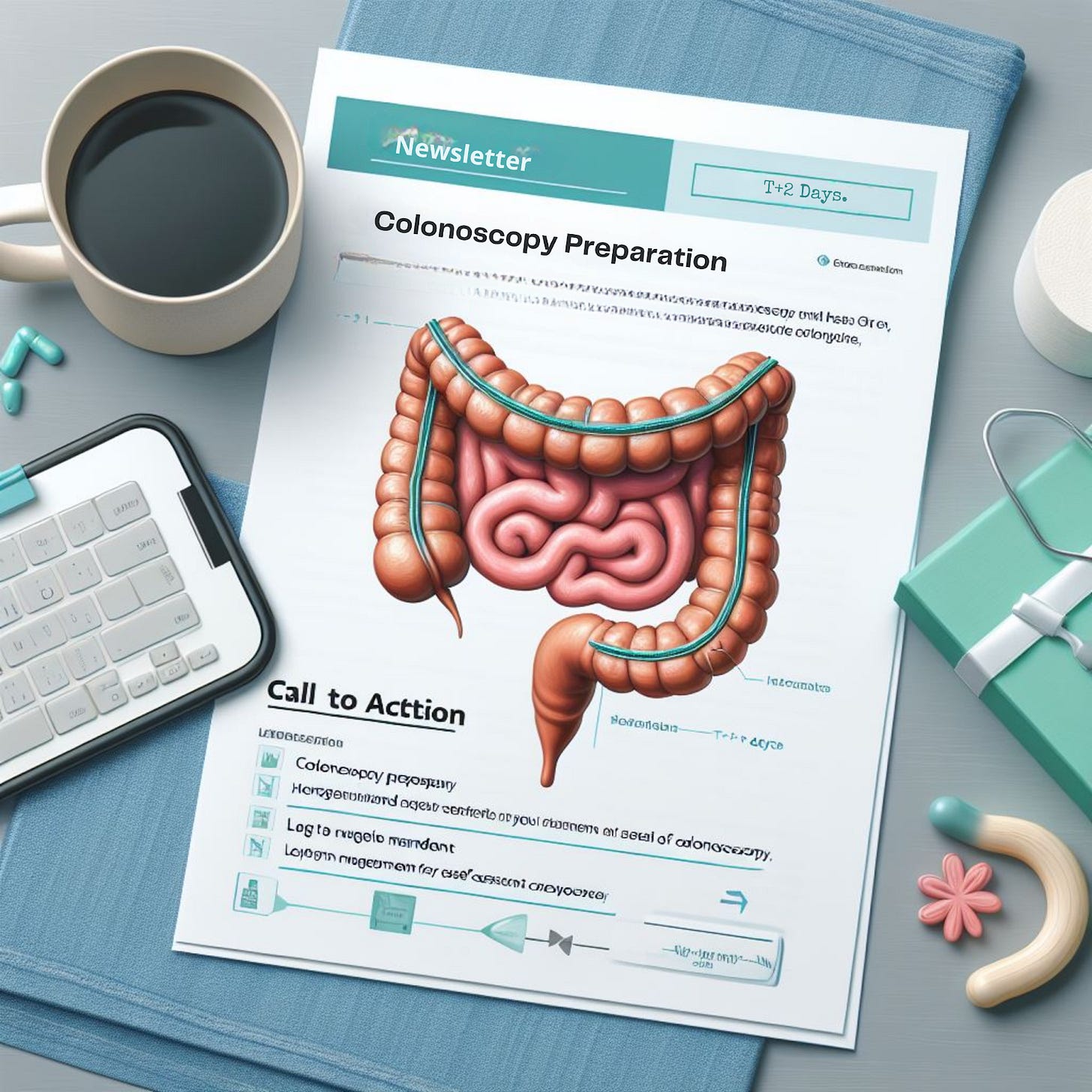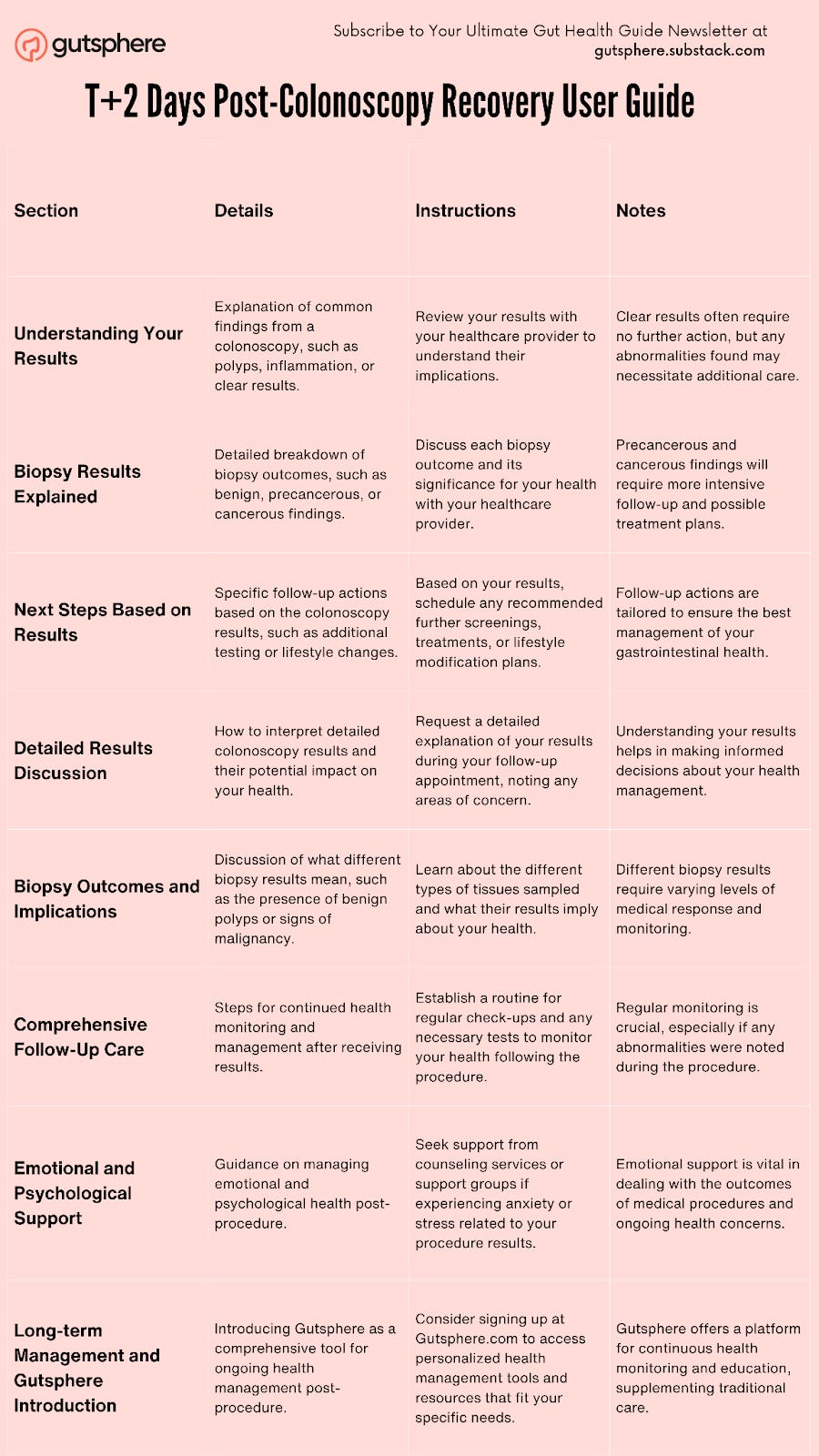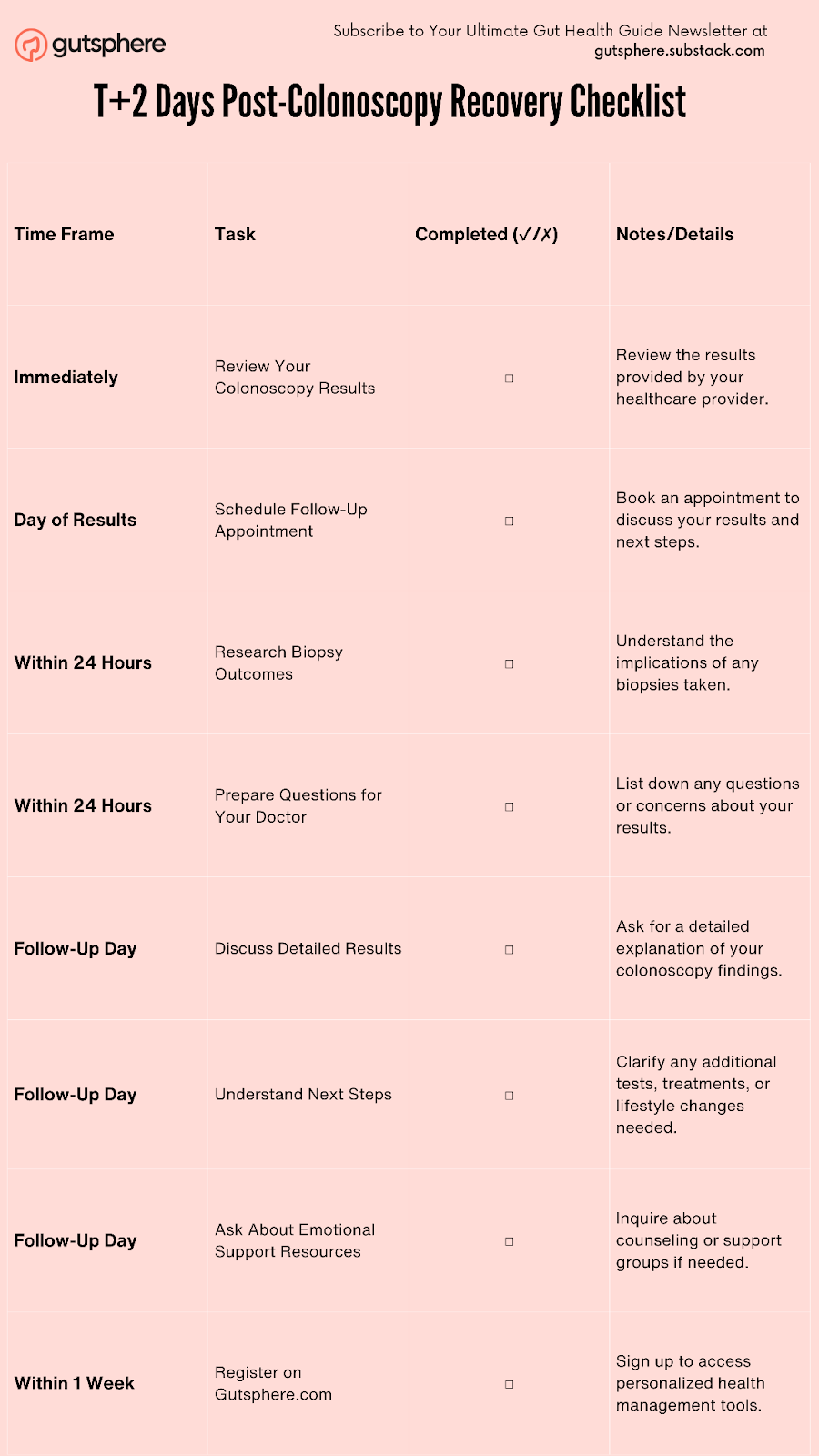Colonoscopy Preparation Timeline Handbook. Episode 13
T+ 2 days Follow-Up. Long-term Management for Self-Care.
Welcome back to our Colonoscopy Preparation Podcast series. I'm your host, Bimal Maharjan, and today we're diving into the T+2 Days Follow-Up episode. After your procedure, it's crucial to understand the results and the next steps in your recovery and long-term management. This episode will guide you through understanding your colonoscopy results, what they mean for your health, and how to effectively manage your care moving forward.
In this session, we'll explore the intricacies of follow-up care, discuss the implications of biopsy results, and outline the potential next steps based on your outcomes. We'll also introduce you to Gutsphere, a platform we're developing to revolutionize long-term GI health management. We'll discuss why this platform is essential, what it offers, how it operates, and how it differs from traditional health management approaches.
Today's information is grounded in the latest clinical guidelines and enriched with insights from leading gastroenterologists, ensuring you receive both expert advice and practical tips for ongoing care. As always, our goal is to empower you with knowledge and tools to manage your health proactively.
Remember, while this podcast provides valuable information, it's crucial to continue consulting with your healthcare provider for personalized advice and treatment. Stay tuned as we delve into these important topics, helping you to navigate the post-procedure landscape with confidence and clarity.
Understanding Follow-Up Care
Results Discussion:
Q1: When and how will I receive the detailed results of my colonoscopy?
Notification and Communication:
Key Point: The method of receiving your results can vary depending on your healthcare provider.
Supporting Example: Most clinics will offer a follow-up appointment where your gastroenterologist will discuss the results with you in detail. Some may also provide initial results through a secure online patient portal.
Evidence: According to health communication standards, results should be communicated directly by a healthcare professional who can explain the findings and answer any questions.
Timeline:
Key Point: The timeline for receiving results can vary based on the findings during the procedure.
Supporting Example: If no biopsies were taken, you might receive your results within a few days. However, if tissue samples were collected for biopsy, it may take a week or more to get detailed results as the samples undergo pathological examination.
Evidence: Studies show that prompt reporting of results is crucial for effective patient care and can alleviate anxiety associated with waiting.
Understanding Your Results:
Key Point: It's important to understand what the results mean for your health.
Supporting Example: Your results might indicate a clear colon, the presence of polyps, or other issues. Each outcome has different implications for your health and potential future screenings.
Evidence: Research indicates that patient education on the implications of colonoscopy findings can significantly impact their long-term health management and compliance with follow-up recommendations.
Preparing for the Discussion:
Key Point: Being prepared can help you make the most of your results appointment.
Supporting Example: Write down any questions or concerns you have about your procedure or potential findings beforehand, so you’re ready to discuss them with your doctor during your follow-up.
Evidence: A study on patient outcomes suggests that patients who come prepared with questions often feel more satisfied with their care and have a better understanding of their health situation.
Understanding Biopsy Results
Biopsy Results Discussion:
Q2: If biopsies were taken, what are the potential outcomes, and what do each of those mean for my health?
Types of Biopsy Outcomes:
Key Point: Biopsies during a colonoscopy are taken to examine any suspicious areas more closely, which could range from mild inflammation to potential precancerous growths.
Supporting Example: Common findings from biopsies include benign polyps, hyperplastic polyps, adenomas, and in rarer cases, malignant cancer cells.
Evidence: According to the American Cancer Society, early detection of colorectal cancer through screenings like colonoscopies significantly improves treatment outcomes, which is why biopsies are crucial.
Interpreting Results:
Key Point: The results from a biopsy can inform your doctor about the nature of any growths or abnormalities in your colon.
Supporting Example: Benign polyps are common and generally not harmful, but adenomas can be precancerous and might require removal and ongoing surveillance.
Evidence: Clinical guidelines suggest that removing adenomatous polyps reduces the risk of developing colorectal cancer in the future.
Health Implications:
Key Point: Each type of biopsy result carries different implications for your health management.
Supporting Example: If benign polyps are found, they may simply be removed during the colonoscopy with no further action needed unless they are numerous or large. However, if adenomatous or malignant polyps are detected, more extensive treatment and frequent surveillance colonoscopies may be necessary.
Evidence: Research shows that patients with adenomatous polyps have a higher risk of colorectal cancer, which is why regular follow-up is essential.
Next Steps After Biopsy Results:
Key Point: Your follow-up care will depend on the biopsy results.
Supporting Example: For benign results, routine follow-up colonoscopies might be recommended every 5-10 years. For more serious findings, such as high-risk adenomas or cancer, your doctor will discuss more immediate treatment options and closer monitoring.
Evidence: The follow-up intervals and treatments are based on guidelines developed from large-scale studies that assess the best outcomes for patients based on specific biopsy results.
In conclusion, understanding the outcomes of any biopsies taken during your colonoscopy is key to determining your future health management. Each result has specific implications, from routine monitoring for benign polyps to more aggressive treatment and surveillance for precancerous or cancerous findings. Be sure to discuss your biopsy results in detail with your gastroenterologist to understand your specific health needs and to plan your care accordingly. Always remember, proactive management and regular screenings are your best tools in maintaining gastrointestinal health.
Next Steps Based on Results:
Discussion of Next Steps:
Q3: Depending on my colonoscopy results, what are the next steps? Are there additional tests or procedures I should anticipate?
Normal Results:
Key Point: If your colonoscopy results are normal and no abnormalities are found, the next steps typically involve routine follow-up screenings at intervals recommended by your healthcare provider.
Supporting Example: For individuals with no risk factors and a normal result, a follow-up colonoscopy might be scheduled for 10 years later.
Evidence: According to guidelines from the American Cancer Society, a 10-year interval is standard for individuals with an average risk and a clean colonoscopy result.
Polyps or Other Abnormalities:
Key Point: If polyps or other abnormalities are detected, the next steps depend on the type, size, and number of polyps found.
Supporting Example: Small benign polyps may simply be removed and require no further immediate action, but a follow-up colonoscopy might be recommended sooner, such as in 3-5 years, to monitor for new growths.
Evidence: Studies show that regular monitoring after the removal of polyps significantly reduces the risk of colorectal cancer.
High-Risk Findings:
Key Point: More serious findings, such as large or multiple adenomatous polyps, or any signs of cancer, require more detailed follow-up, which may include additional diagnostic tests or treatments.
Supporting Example: This might include a repeat colonoscopy in 1 to 3 years, imaging tests, or consultations with oncologists if cancerous cells are detected.
Evidence: Guidelines from the National Comprehensive Cancer Network (NCCN) recommend more frequent surveillance and possibly additional interventions based on the risk level determined by the initial findings.
Inconclusive or Unclear Results:
Key Point: Sometimes results can be inconclusive or unclear, necessitating further evaluation.
Supporting Example: If visual clarity was an issue during your colonoscopy due to inadequate bowel prep, a repeat colonoscopy might be necessary.
Evidence: Inadequate bowel preparation can occur in up to 25% of cases and significantly impacts the ability to detect abnormalities, as noted in clinical studies.
Additional Tests or Procedures:
Key Point: Depending on your specific results, additional tests such as CT colonography, MRI, or blood tests may be required to further investigate or manage detected abnormalities.
Supporting Example: For instance, if a potential malignancy is noted, a CT scan may be ordered to check for metastasis.
Evidence: Advanced imaging techniques can provide more detailed information about the extent of disease and guide treatment planning.
T+2 Days Post-Colonoscopy Recovery User Guide
Instructions for Use:
Before Starting: Read the guide completely before your follow-up appointment to prepare for discussing your results with your healthcare provider.
During Recovery: Use the guide as a reference to manage both your physical recovery and understanding of medical findings.
Post-Recovery: Continuously refer back to this guide to ensure adherence to follow-up care and long-term health management plans.
Printing Instructions:
Format: Print this guide in portrait format for easy reference.
Paper Size: Standard A4 paper is recommended for clear readability.
Accessibility: Keep the guide easily accessible, especially during medical appointments and discussions.
T+2 Days Post-Colonoscopy Recovery Checklist
Thank you for joining us on the final episode of our Colonoscopy Preparation Podcast series. I'm your host, Bimal Maharjan, and as we conclude this journey, let’s revisit the crucial insights from our last episode and recap what we've covered throughout the series.
Recap of Last Episode - T+2 Days Follow-Up:
In our final episode, we focused on long-term management and understanding the implications of your colonoscopy results. We discussed how to interpret and react to biopsy results, what potential outcomes mean for your health, and the next steps based on those results. This episode is essential for planning your future health strategy and ensuring continued care.
Series Recap:
Let's look back at the comprehensive guidance provided in each episode to help you navigate the entire colonoscopy process:
Episode 1: Welcome Guide — We introduced what a colonoscopy is and why it's crucial for detecting and preventing gastrointestinal issues.
Episode 2: T-14 Days — Covered how to pick up and understand your prep solution.
Episode 3: T-7 Days — Focused on adjusting medications and arranging transportation.
Episode 4: T-5 Days — Detailed medication adjustments necessary to safely prepare for your procedure.
Episode 5: T-3 Days — Outlined final dietary preparations and set expectations for the coming days.
Episode 6: T-1 Day Morning — Discussed the morning preparations needed the day before your procedure.
Episode 7: T-1 Day Afternoon — Guided you through afternoon preparations the day before the procedure.
Episode 8: T-1 Day Evening — Explained the critical evening preparations on the eve of your colonoscopy.
Episode 9: T-6 Hours — Reviewed last-minute preparations before heading to the hospital.
Episode 10: T-2 Hours (Arrival) — What to do upon arrival at the facility, ensuring you are fully prepared for the procedure.
Episode 11: T+2 Hours Post-Procedure — Provided immediate post-procedure care tips.
Episode 12: T+1 Day — Offered recovery tips for the day after the procedure, ensuring a smooth transition back to normal life.
Episode 13: T+2 Days Follow-Up — Discussed how to understand and manage your results and outlined the importance of follow-up care.
Introduction to Gutsphere:
As we close this series, I want to introduce Gutsphere, an innovative platform dedicated to long-term gastrointestinal health management. Gutsphere is designed to support your ongoing health needs by providing accessible, actionable, and affordable tools tailored to your unique health profile.
Why Gutsphere?
Gutsphere complements traditional healthcare by providing a continuous learning and management solution, helping you become an active participant in your health. It’s about making healthcare personal, predictive, and preventive.
Call to Action:
I encourage you to visit Gutsphere.com and register today. Start leveraging the resources that will empower you to manage your health proactively.
Final Thanks and Farewell:
It's been a pleasure guiding you through your colonoscopy preparation and recovery. We hope this series has provided you with the knowledge and confidence to manage your gastrointestinal health effectively. Remember, the care you take today shapes your health tomorrow. Thank you for listening, take care, and stay proactive about your health.
Request
Share
Our sincere request to you is to share the newsletter with your friends, family, and community so that they can benefit from the content. Also it will help us grow the newsletter, and eventually, as we release more content, digital tools, and more we will enable people around the world to live chronic disease free.
Subscribe
Feedback
Also, please give us feedback so that we can improve the content. And if there are any topics that you want us to cover please send us your questions and topics. Furthermore, if you try any of the things we provided information please share your experience with us.
Thank You
GutSphere Team
Disclaimer
Please note that the information provided in this newsletter is for informational purposes only and should not be considered as a substitute for professional medical advice, diagnosis, or treatment. If you have any concerns or questions about our health, please consult with a licensed healthcare professional. The information contained in this newsletter is not intended to diagnose, treat, cure, or prevent any disease. The publisher and authors of this newsletter assume no responsibility for any adverse effects that may result from the use of the information contained herein.
References:
Understanding Follow-Up Care:
https://www.asge.org/docs/default-source/guidelines/recommendations-for-follow-up-after-colonoscopy-and-polypectomy-a-consensus-update-by-the-us-multi-society-task-force-on-colorectal-cancer-2020-march-gie.pdf?sfvrsn=2b0f8952_2
Biopsy Results:
https://www.verywellhealth.com/basics-of-a-colon-biopsy-797645
Next Steps Based on Results:
https://www.asge.org/docs/default-source/guidelines/recommendations-for-follow-up-after-colonoscopy-and-polypectomy-a-consensus-update-by-the-us-multi-society-task-force-on-colorectal-cancer-2020-march-gie.pdf?sfvrsn=2b0f8952_2
Introduction to AI Copilot:
https://www.asge.org/docs/default-source/guidelines/recommendations-for-follow-up-after-colonoscopy-and-polypectomy-a-consensus-update-by-the-us-multi-society-task-force-on-colorectal-cancer-2020-march-gie.pdf?sfvrsn=2b0f8952_2
Benefits of AI Copilot:
https://mcpress.mayoclinic.org/healthy-aging/ai-in-healthcare-the-future-of-patient-care-and-health-management/
Personalization:
https://azure.microsoft.com/en-us/blog/azure-ai-health-bot-helps-create-copilot-experiences-with-healthcare-safeguards/
Prevention Strategies:
https://www.asge.org/docs/default-source/guidelines/recommendations-for-follow-up-after-colonoscopy-and-polypectomy-a-consensus-update-by-the-us-multi-society-task-force-on-colorectal-cancer-2020-march-gie.pdf?sfvrsn=2b0f8952_2
Recovery Monitoring:
https://www.asge.org/docs/default-source/guidelines/recommendations-for-follow-up-after-colonoscopy-and-polypectomy-a-consensus-update-by-the-us-multi-society-task-force-on-colorectal-cancer-2020-march-gie.pdf?sfvrsn=2b0f8952_2
Integration with Chronic Conditions:
https://www.asge.org/docs/default-source/guidelines/recommendations-for-follow-up-after-colonoscopy-and-polypectomy-a-consensus-update-by-the-us-multi-society-task-force-on-colorectal-cancer-2020-march-gie.pdf?sfvrsn=2b0f8952_2
Medication and Diet:
https://www.asge.org/docs/default-source/guidelines/recommendations-for-follow-up-after-colonoscopy-and-polypectomy-a-consensus-update-by-the-us-multi-society-task-force-on-colorectal-cancer-2020-march-gie.pdf?sfvrsn=2b0f8952_2
Regular Check-ins:
https://www.asge.org/docs/default-source/guidelines/recommendations-for-follow-up-after-colonoscopy-and-polypectomy-a-consensus-update-by-the-us-multi-society-task-force-on-colorectal-cancer-2020-march-gie.pdf?sfvrsn=2b0f8952_2
Human Support:
https://www.asge.org/docs/default-source/guidelines/recommendations-for-follow-up-after-colonoscopy-and-polypectomy-a-consensus-update-by-the-us-multi-society-task-force-on-colorectal-cancer-2020-march-gie.pdf?sfvrsn=2b0f8952_2
Data Security:
https://www.asge.org/docs/default-source/guidelines/recommendations-for-follow-up-after-colonoscopy-and-polypectomy-a-consensus-update-by-the-us-multi-society-task-force-on-colorectal-cancer-2020-march-gie.pdf?sfvrsn=2b0f8952_2
Consent and Privacy:
https://www.asge.org/docs/default-source/guidelines/recommendations-for-follow-up-after-colonoscopy-and-polypectomy-a-consensus-update-by-the-us-multi-society-task-force-on-colorectal-cancer-2020-march-gie.pdf?sfvrsn=2b0f8952_2
Program Impact:
https://www.fastcompany.com/91039978/copilotiq-most-innovative-companies-2024




